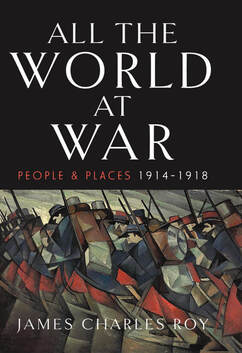Books
|
All the World at War
(Pen & Sword Books, UK, 2023; U.S. publication date forthcoming). "The First World War has produced a vast literature and Roy's treatment of the subject ranks with the best. He has immersed himself in a vast range of primary and secondary sources and his text demonstrates a sophisticated appreciation of the issues involved in that conflict. A superb book, full of fascinating detail and written in a most appealing style, a veritable page turner. This particular version deserves to become a classic." -Professor Jack Spence, OBE, distinguished scholar of war and international history, Fellow of King’s College London "James Charles Roy's history of the First World War offers a vivid and wide-ranging narrative, encompassing both events and individuals in a kaleidoscopic approach to a well-known story." -C. Brad Faught, professor of history and global studies, Tyndale University; author of The Oxford Movement, The New A-Z of Empire and Kitchener: Hero and Anti-Hero, among other titles. "This is an unusual history of the First World War, the fruit of long reflection, research and much travelling. A rich and thought-provoking book. It doesn't offer a straight narrative history of the war. Anyone ignorant of that might be better to read other works first. But there is a great sweep to Roy's work, and his character sketches are acute and – to my mind – fair." -Allan Massie, The Scotsman, novelist and critic, author of A Question of Loyalties. [PDF of Massie's full review] |
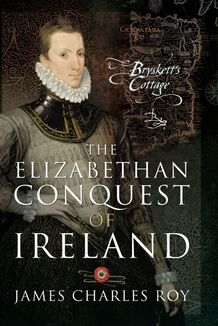
The Elizabethan Conquest of Ireland
(Pen & Sword Books, UK, 2021).
"James Charles Roy invariably takes an original, challenging and creatively oblique view of Irish history, and his study of the Elizabethan regime’s attempts to subdue the country is no exception. Bryskett’s Cottage surveys and explores not only the catalogue of war, conquest and attempted settlement, and the campaign of Elizabethan soldiers and statesmen to create (or suborn) a local aristocracy; the book also focuses on the intellectual efforts of Englishmen to come to terms with a country which they variously depicted as exotic, seductive, savage, irreconcilable and religiously subversive. The manner in which Irish themes infuse the poet Edmund Spenser’s work, and the reflections of his Irish experience through his complex analysis of statecraft and monarchical authority, forms a central thread - teased out through the recurring focus on a kind of symposium in the eponymous ‘Cottage’, where Spenser played an important part. Overall, Roy’s book both delineates the tortuous and often brutal story of English rule in Ireland during this transformative era; it also traces out themes (religious, intellectual and psychological) which would characterise the tangled relationship between the two countries for the ensuing centuries. It is a richly-textured, impressively researched and powerfully involving story, written with a full realization of its tragic and haunting relevance for future times."
-Roy Foster, author of Modern Ireland, 1600-1972 (London: Penguin, 1988), among several titles
"I have read the chapters on the Great O’Neill and Essex with interest. James Charles Roy is well in control of the material and is excellent at creating atmosphere while developing a fast narrative. Roy proves himself up-to-date with the most recent scholarship, and quotes extensively from primary sources, doing so very well. I look forward to seeing the book."
-Nicholas Canny, National University of Ireland, Galway. Author of Making Ireland British: 1580-1650 (Oxford: Oxford University Press, 2001) among other titles.
"Though not myself a specialist in sixteenth-century Irish history, I have long been an admirer of Roy’s work and had the honour of commissioning his magnificent edition of Henry Stratford Persse’s Letters from Galway to America, 1821–1832 (Cork University Press, 1998) for the series Irish Narratives. This book, co-edited by James L. Pethica, incorporated meticulous annotated transcriptions of original letters preceded by a learned and wide-ranging introduction. Jim Roy is remarkable for his wide intellectual range, erudition, penetrating analysis, capacity for sustained research, and deep familiarity with sources relating to Elizabethan Ireland. His book will add significantly to scholarship in a field already served by outstanding scholars such as Nicholas Canny and Ciaran Brady, whose edition of Sir Henry Sidney’s Memoir of Service in Ireland was also published in Irish Narratives. I have no doubt that Bryskett’s Cottage will be enthusiastically received by a wide range of scholars and lay enthusiasts."
-David Fitzpatrick, Trinity College, Dublin. Author of The Two Irelands (Oxford: Oxford University Press, 1998), among other titles. Series editor Irish Narratives, including A Viceroy’s Vindication: Sir Henry Sidney’s Memoir of Service in Ireland, 1556-78 (Cork: Cork University Press, 2002).
"The book presents both sides of the English-Irish troubles, revolts, rebellions, and wars during the reign of the Tudors. The first chapters set the stage for the misadventures of the English in Ireland, and the Irish in England (especially at Queen Elizabeth’s court), and for the rise of Irish clan culture in the face of English tyranny and taxation. The clash of cultures is dramatized from the first pages: the English in Ireland are amateurish in their futile attempts to control the people they see not only as “rebels” but also as “rabble” and “bog trotters.” The Celtic race, “madly fond of war,” proves to be indifferent and hostile, at best, to the idea of treaties and expansion of the English empire. Gerald Fitzgerald is a case in point: he was “a man void of judgment to govern and will to be ruled,” according to Sidney. Other Irish leaders were not unlike him.
I thought the book was particularly interesting because it focused on the people—the main players in the Tudors’ transactions with the Irish—rather than on the policies. The narrative exposes not only the ineptitude of the people behind the negotiating and treaty-making, but also a Queen unable to focus her mind on answering letters and wresting results from her courtiers’ long years of what appeared to be exile to Ireland and away from court. Whereas many histories emphasize one side of Elizabeth as a canny and focused politician, and a masterful Queen, this book presents her as a woman whose romantic poor judgment interferes with her duties and whose lack of interest in—and commitment to—Ireland leads to extremes of violence on both sides."
-Professor Laurie Kaplan, Academic Director of George Washington University’s England Center, numerous articles on Shakespeare and English authors.
Read Josephine Fenton's full review in The Irish Examiner: https://www.irishexaminer.com/lifestyle/artsandculture/arid-40732521.html
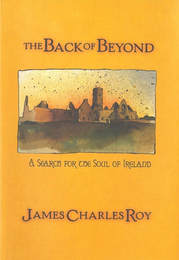
The Back of Beyond: A Search for the Soul of Ireland
(Boulder, CO: Westview Press, 2002). Soft-cover edition, 2004.
“A group of jaded American tourists are in for a surprise with James Charles Roy as their guide. In The Back of Beyond he takes them on a tour of the Emerald Isle that goes beyond conventional guidebooks. As they explore Celtic coronation sites, monasteries, and remote abbeys, Roy spins a narrative that allows them to understand and appreciate Ireland’s fascinating and turbulent history, and so will the reader.” -Bookreporter.com
“A soulful account of a country in transition, delivered without the unctuous sentimentality that seems to accompany all those insulting publicity brochures about Ireland. Mr. Roy leads his tourist group through myriad adventures such materials seldom mention, charming the most recalcitrant members and giving readers along the way a wrenchingly accurate portrait of a land and its people.” -The Washington Times
(Boulder, CO: Westview Press, 2002). Soft-cover edition, 2004.
“A group of jaded American tourists are in for a surprise with James Charles Roy as their guide. In The Back of Beyond he takes them on a tour of the Emerald Isle that goes beyond conventional guidebooks. As they explore Celtic coronation sites, monasteries, and remote abbeys, Roy spins a narrative that allows them to understand and appreciate Ireland’s fascinating and turbulent history, and so will the reader.” -Bookreporter.com
“A soulful account of a country in transition, delivered without the unctuous sentimentality that seems to accompany all those insulting publicity brochures about Ireland. Mr. Roy leads his tourist group through myriad adventures such materials seldom mention, charming the most recalcitrant members and giving readers along the way a wrenchingly accurate portrait of a land and its people.” -The Washington Times
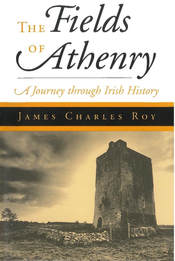
The Fields of Athenry: A Journey Through Irish History
(Boulder, CO: Westview Press, 2001). Soft-cover edition, 2003).
“A delightful portrait of a land split between past and present … A serious history.” -Kirkus
“This is not merely a book about a relatively insignificant structure [Moyode Castle]; it is, instead, a sweeping and daring account of how history is intricately embedded into the Irish landscape. Roy filters nearly a thousand years of Irish history through the experiences of those living around Moyode and, in the process, he offers an exceptional study on the influence that national history has on the local.” -New Hibernia Review
(Boulder, CO: Westview Press, 2001). Soft-cover edition, 2003).
“A delightful portrait of a land split between past and present … A serious history.” -Kirkus
“This is not merely a book about a relatively insignificant structure [Moyode Castle]; it is, instead, a sweeping and daring account of how history is intricately embedded into the Irish landscape. Roy filters nearly a thousand years of Irish history through the experiences of those living around Moyode and, in the process, he offers an exceptional study on the influence that national history has on the local.” -New Hibernia Review
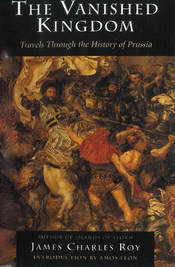
The Vanished Kingdom: Travels Through the History of Prussia
(Boulder, CO: Westview Press, 1999). Soft-cover edition, 2000.
“Roy has a strong sense of place and a sharp eye for topography, which explains why the battle descriptions from Grünwald in 1410 to the Eastern Front of the 1940s are handled so well.” -Times Literary Supplement
“Roy’s haunting book wanders through both the past and the present of this once powerful realm, starting in the thirteenth century, when crusading Teutonic knights drove east of the Vistula to conquer the heathen, and continues into the present, in which a legacy of war, atrocity, and exploitation survives as ethnic hatred in a ruined landscape.” -The New Yorker
“The world of the Junkers comes to impetuous life in Roy’s engrossing account of eight centuries of the German heartland, The Vanished Kingdom.” -The Boston Globe
“Remarkable … A hitherto almost empty history of a vital part of Europe comes alive.” -John Toland, author The Rising Sun, winner of the Pulitzer Prize.
(Boulder, CO: Westview Press, 1999). Soft-cover edition, 2000.
“Roy has a strong sense of place and a sharp eye for topography, which explains why the battle descriptions from Grünwald in 1410 to the Eastern Front of the 1940s are handled so well.” -Times Literary Supplement
“Roy’s haunting book wanders through both the past and the present of this once powerful realm, starting in the thirteenth century, when crusading Teutonic knights drove east of the Vistula to conquer the heathen, and continues into the present, in which a legacy of war, atrocity, and exploitation survives as ethnic hatred in a ruined landscape.” -The New Yorker
“The world of the Junkers comes to impetuous life in Roy’s engrossing account of eight centuries of the German heartland, The Vanished Kingdom.” -The Boston Globe
“Remarkable … A hitherto almost empty history of a vital part of Europe comes alive.” -John Toland, author The Rising Sun, winner of the Pulitzer Prize.
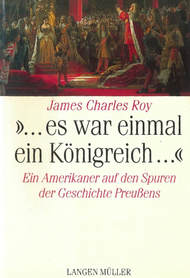
German edition:
Es War Einmal Ein Konigreich: Ein Amerikaner Auf Den Spuren Der Geschichte Preussens
(Munich: Langen Muller, 2001).
Es War Einmal Ein Konigreich: Ein Amerikaner Auf Den Spuren Der Geschichte Preussens
(Munich: Langen Muller, 2001).
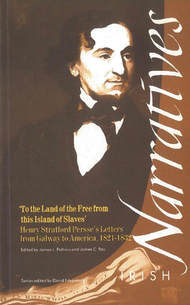
‘To The Land of the Free from this Island of Slaves’: Henry Stratford Persse’s Letters from Galway to America, 1821-1832
With Dr. James L. Pethica, general editor, Dr. David Fitzpatrick, Trinity College, Dublin (Cork: Cork University Press, 1998). Second edition, 1999.
“A remarkable source for the study of both Irish political and social history as well as Irish attitudes towards emigration in the 1820s.” -Irish Literary Supplement
“This is a fascinating and well-planned series, giving real-life glimpses of Irish history. Well edited and produced. The most substantial [title in this series] is Henry Strafford Persse’s Letters.” -The Irish Times
“An ambitious series … [This book] offers a vivid and irregular perspective on the economic and social conditions of the Ascendancy. In a moderate and well-paced introduction, the historical context in which the letters were written is reconstructed … By presenting Persse’s letters in historical context [this volume] provides new and thought-provoking testimony on internal relations between the Ascendancy and their tenants. It also contributes toward a more nuanced social history of Irish emigration to the United States.” -New Hibernian Review
“Pethica and Roy execute their editorial task with marked flair.” -Journal of the Galway Archaeological & Historical Society
With Dr. James L. Pethica, general editor, Dr. David Fitzpatrick, Trinity College, Dublin (Cork: Cork University Press, 1998). Second edition, 1999.
“A remarkable source for the study of both Irish political and social history as well as Irish attitudes towards emigration in the 1820s.” -Irish Literary Supplement
“This is a fascinating and well-planned series, giving real-life glimpses of Irish history. Well edited and produced. The most substantial [title in this series] is Henry Strafford Persse’s Letters.” -The Irish Times
“An ambitious series … [This book] offers a vivid and irregular perspective on the economic and social conditions of the Ascendancy. In a moderate and well-paced introduction, the historical context in which the letters were written is reconstructed … By presenting Persse’s letters in historical context [this volume] provides new and thought-provoking testimony on internal relations between the Ascendancy and their tenants. It also contributes toward a more nuanced social history of Irish emigration to the United States.” -New Hibernian Review
“Pethica and Roy execute their editorial task with marked flair.” -Journal of the Galway Archaeological & Historical Society
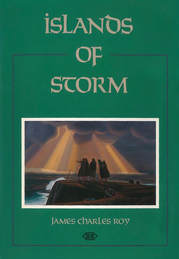
Islands of Storm
(Dublin and Chester Springs, PA: Wolfhound Press, Dufour Editions, 1991). Soft-cover edition, 1991.
Book of the Month Club Alternative Selection, History Book Club of the Month selection.
“Islands abandoned by man hold for some of us an extraordinary fascination and the islands of Inishmurray, Inishkea and Iona off the Irish and Scottish coasts are here visited both intellectually and physically by a writer who is both erudite and insightful. The result is a very personal narrative and a wonderfully engaging book.”
-Brian Moore, author of The Luck of Ginger Coffey, Catholics, Black Robes, and 24 other novels.
“An exceptionally good writer … Islands is a history treatise in which Roy examines not only the history and outstanding figures of early Celtic Christianity, but the origins of Christianity itself, including reflections on key patristic writers [and] the world of the early desert fathers.” -Eire-Ireland
(Dublin and Chester Springs, PA: Wolfhound Press, Dufour Editions, 1991). Soft-cover edition, 1991.
Book of the Month Club Alternative Selection, History Book Club of the Month selection.
“Islands abandoned by man hold for some of us an extraordinary fascination and the islands of Inishmurray, Inishkea and Iona off the Irish and Scottish coasts are here visited both intellectually and physically by a writer who is both erudite and insightful. The result is a very personal narrative and a wonderfully engaging book.”
-Brian Moore, author of The Luck of Ginger Coffey, Catholics, Black Robes, and 24 other novels.
“An exceptionally good writer … Islands is a history treatise in which Roy examines not only the history and outstanding figures of early Celtic Christianity, but the origins of Christianity itself, including reflections on key patristic writers [and] the world of the early desert fathers.” -Eire-Ireland
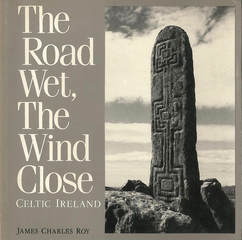
The Road Wet, The Wind Close: Celtic Ireland
(Dublin and Chester Springs, PA: Gill and Macmillan Ltd., Dufour Editions, 1984 [2 editions]). Soft-cover editions (4) 1987-1993.
“An erudite yet companionable ramble through several millennia of Irish life, from the Neolithic to the 12th century … Richly anecdotal, yet intellectually disciplined and honest, it shares with readers both the specific complexity of early Ireland and a more general joy of learning.” -The Los Angeles Times
“A splendid celebration of the charisma that lifted the Celts of Ireland above their chaotic and warlike ways almost in spite of themselves.” -The Boston Globe
“An evocative, gracefully written book that will appeal to anyone who’s curious about the past – and the various ways our visions of it play off and influence the present.” -The Chicago Sun Times
“The author may not be an academic but, as we say here, he has met the scholars. The work he has produced is a considerable achievement… His reading is exhaustive and his presentation readable and engaging. I can heartily recommend this book.” -Marie de Paor, historian, The Irish Sunday Press
(Dublin and Chester Springs, PA: Gill and Macmillan Ltd., Dufour Editions, 1984 [2 editions]). Soft-cover editions (4) 1987-1993.
“An erudite yet companionable ramble through several millennia of Irish life, from the Neolithic to the 12th century … Richly anecdotal, yet intellectually disciplined and honest, it shares with readers both the specific complexity of early Ireland and a more general joy of learning.” -The Los Angeles Times
“A splendid celebration of the charisma that lifted the Celts of Ireland above their chaotic and warlike ways almost in spite of themselves.” -The Boston Globe
“An evocative, gracefully written book that will appeal to anyone who’s curious about the past – and the various ways our visions of it play off and influence the present.” -The Chicago Sun Times
“The author may not be an academic but, as we say here, he has met the scholars. The work he has produced is a considerable achievement… His reading is exhaustive and his presentation readable and engaging. I can heartily recommend this book.” -Marie de Paor, historian, The Irish Sunday Press
